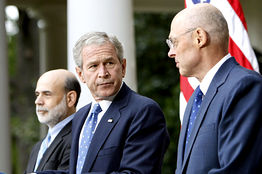 I am sure I’m not that different from many others when I ask the simple question, what happened? How did the banks get into such a mess? What didn’t they see, and what regulation failed? Was the reserve ratio that the federal reserve demands too low? Did debt move from regulated to unregulated, and if so, why would that have caused a failure of regulated banks? How is it that the vast amount of debt went unrecorded until recently? And what are we doing wrong now?
I am sure I’m not that different from many others when I ask the simple question, what happened? How did the banks get into such a mess? What didn’t they see, and what regulation failed? Was the reserve ratio that the federal reserve demands too low? Did debt move from regulated to unregulated, and if so, why would that have caused a failure of regulated banks? How is it that the vast amount of debt went unrecorded until recently? And what are we doing wrong now?
The New York Times offers a new insight into what had happened. According to this article, a decision in 2004 by the SEC, headed by William Donaldson at the time, permitted banks to exceed the reserve ratio in their investment houses, and money seemingly flew freely between the two. There was meant to be oversight of the banks’ health at the time, but that oversight never happened.
Why did the banks seek this change in 2004? They did not believe they could compete against the large investment houses with so much money tied up in case of a credit crunch. Put another way, we forgot some of the lessons of the 1920s.
And so it’s now obvious to all. President Bush has not only presided over the worst financial debacle since the Great Depression, but he and his team failed to learn from the mistakes of that era, making him worse than President Hoover, in my book.
What do we need to do to fix the problems? Some of it has already happened. Banks have become very conservative, and perhaps are leaning too far: it’s very hard to tell when the country is teetering on a recession. Some of that conservative nature needs to be codified by reversing the 2004 decision or requiring investment houses to meet the reserve ratio. In order to figure out which we have to question whether or not we can let a large investment house fail. If we cannot, then more regulation is appropriate. One way to split the baby is to require regulation of total assets and debt above a certain number, say the $5 billion talked about in the article.
